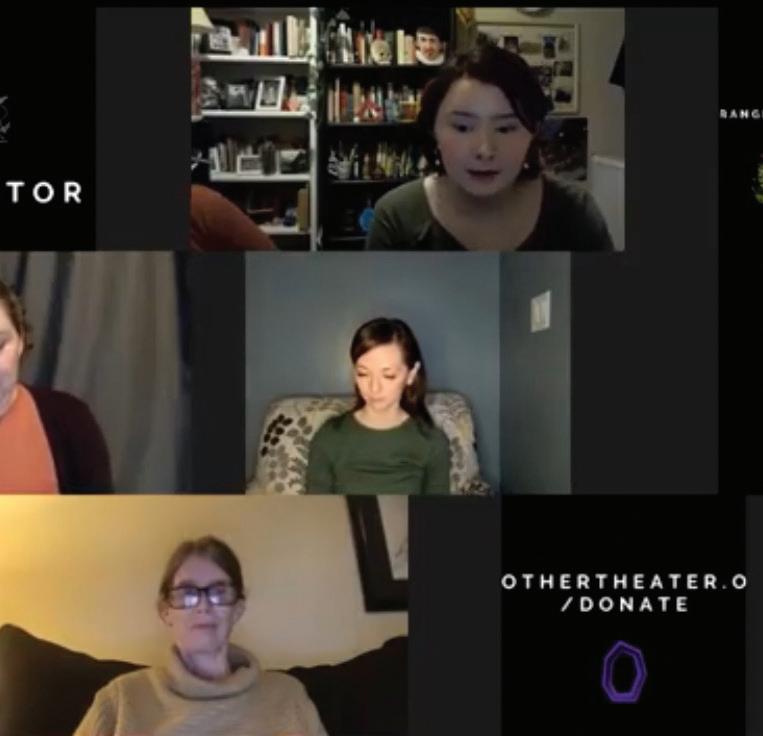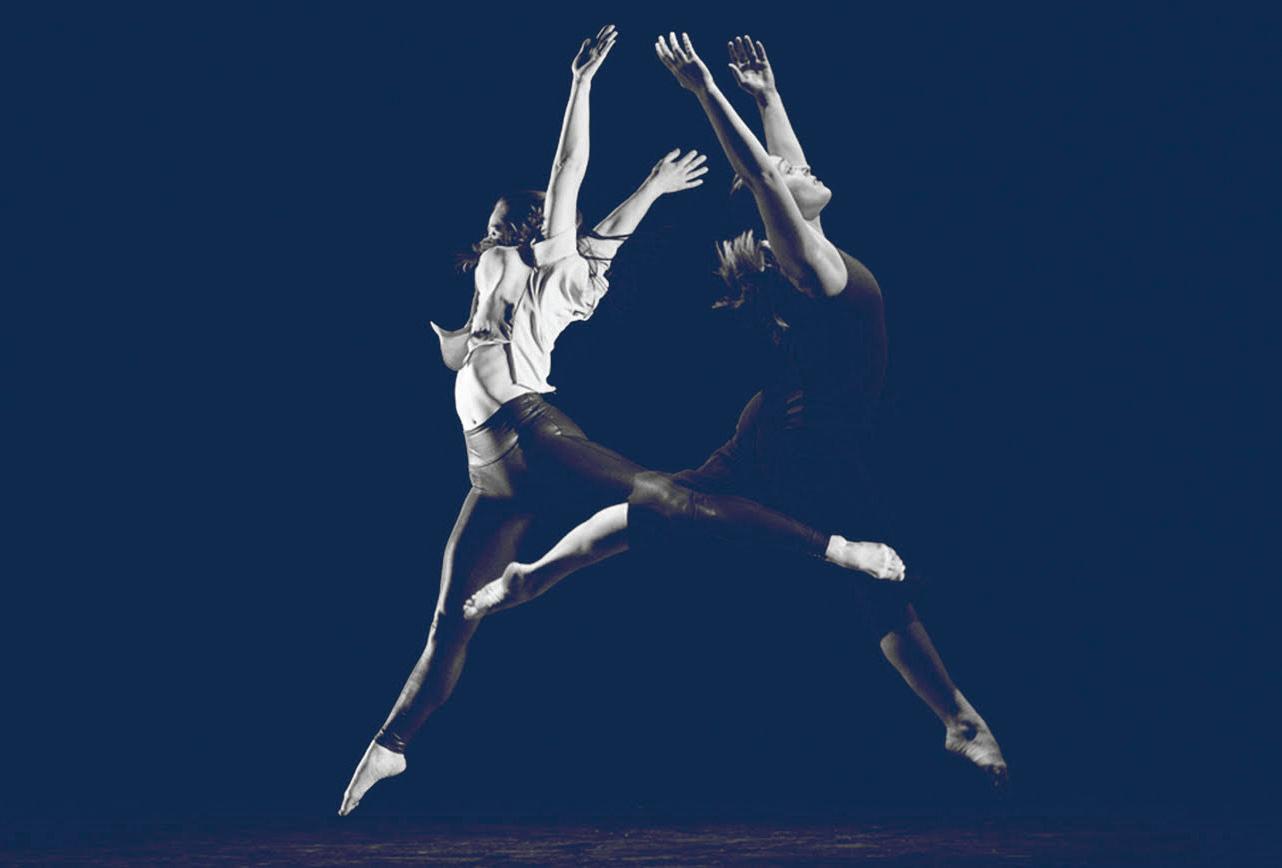
9 minute read
A&E


Advertisement

King’s English online: Paisley Rekdal: Appropriate and Todd Robert Peterson: Picnic in the Ruins
Sometimes a double-feature offers a thematic connection—a pair of horror movies, or a duet of romantic comedies. And sometimes, it’s a pairing that presents a variety, allowing those with one particular interest to, perhaps, find an interest in something new.
This week, The King’s English Bookshop presents a virtual author event showcasing two very different writers and their work. First, Utah poet laureate Paisley Rekdal (pictured) approaches the fraught subject matter of “cultural appropriation” in writing in her new book Appropriate. Putting on her hat as a creative writing instructor at the University of Utah, Rekdal digs into both the history and the contemporary controversies surrounding writers speaking in voices unlike their own, using examples of those who have done it with empathy and how the power of cultural whiteness has shaped literary discourse. The focus shifts from non-fiction to fiction with Todd Robert Peterson’s novel Picnic in the Ruins. It follows anthropologist Sophia Sheperd as she researches the impact of tourism on cultural sites at the UtahArizona border, and crosses paths with a pair of inept small-time criminals. The result is an often-comic investigation of the ethics of preservation and who gets to “own” the past, all tangled up in hot-button issues like oil exploration on public lands.
This two-part conversation takes place via Crowdcast, free but with registration required, on Thursday, Feb. 25 at 6 p.m. Visit kingsenglish.com for additional information and link to registration. (Scott Renshaw)
AUSTEN DIAMOND PHOTOGRAPHY
RDT: Regalia
Every year, Repertory Dance Theatre offers a choreography competition showcasing exciting new work. While that work isn’t going to take place in front of a live audience in 2021, there’s still a chance for viewers to enjoy the fruits of these creative labors— and even help decide the best of the best.
Beginning Feb. 22, at-home viewers have had the opportunity to view the program of works by four choreographers via rdtutah.org. The participating choreographers include Ruby Cabbell, currently a performer with Wasatch Contemporary Dance Company; Kaley Pruitt, founder of New York-based Kaley Pruitt Dance; Anne Marie Robson Smock, a Salt Lake City native and University of Utah graduate currently based in Brooklyn; and Lauren Simpson, currently an artist-in-residence at
San Francisco’s ODC Theater. While viewing is free, you can get a chance to vote on which choreographer will receive the big prize—a commission to produce their work for RDT’s next season—by making a $25 donation to RDT per vote. You can also participate in a silent auction to raise additional proceeds for the company, or get a VIP ticket package for $25 with perks that include a snack-basket delivery and invitation to a post-performance live-stream party.
It all leads up to a live-stream event on Saturday, Feb. 27 at 7 p.m., which will include live performances and announcement of the Regalia winner. Start viewing the work now, and make your voice heard, all while helping support the next generation of dance talent and a great local arts organization. (SR)
STEPHANIE SHIOZAKI
An Other Theater Company: Tethered
At the opening of Utah playwright Chelsea Hickman’s new one-act play, Tethered, a minister in 1653 England delivers a sermon on the inherent wickedness of woman, a nature born out of being created from a bent rib. An Other Theater Company presents a virtual reading of this new work, which explores assumptions about female roles that may be just as true now as they were 400 years ago.
The center of Tethered is Margaret, a pregnant wife and mother in a town outside of London. Margaret becomes fascinated with her new neighbor, a woman named Sileas who has skills as a healer and midwife—talents which place her precariously close to those which can have a woman labeled as a witch, as the town gossips suggest. And when Margaret’s husband goes missing, suspicions arise—while Margaret herself isn’t entirely sure if his disappearance is something to be mourned or celebrated.
In a playwright’s note, Hickman observes,
“Though I’ve never been accused of witchcraft, I have been accused of sinning. I have been accused of being a flirt, and in the same breath, accused of being a prude. Sometimes, others’ voices are louder than our own. It came to a point that I believed those accusations. I believed the reputations others gave me. Their rumors, their jealousy, their lies, their hate. I was tethered to them, rather than to my own identity.”
Tethered includes content warnings for sexual violence, with other information available at anothertheater.org. The streamed reading is available free through March 6, with donations encouraged. (SR)
Black Hilarity Show @ Wiseguys
Sunday, Feb. 28 might mark the “official” end of Black History Month, but locally, it’s going to go out with a bang. Wiseguys Gateway (194 S. 400 West) notes the occasion with a lineup of all African-American comedians bringing the funny.
The event is organized by local comedian T.J. Taylor (pictured), a relatively newcomer to the scene with a sharpedged sensibility that he showed off in a pre-holiday/post-election show at Wiseguys. “They say that 600,000 people in Utah voted for Trump,” Taylor said. “You know what that tells me about Utah? A lot of you motherfuckers lied to me. … Twentyfive percent of Wyoming voters voted for Joe Biden. Which tells me that one in four people in Wyoming needs to get the fuck out of Wyoming. There’s nothing for you there.”
Taylor will be joined by other Black comedians including California-based Mac Rome, veteran touring comedian Aaron Westly, ex-Marine Kevin Davis, and local favorite Arvin Mitchell, who relocated to Utah from St. Louis to join the cast of the long-running BYU-TV sketch comedy series Studio C. While it might seem like culture shock for an AfricanAmerican to relocate from St. Louis to Utah, Mitchell’s comedy suggests that he prefers to take a humorous view of differences between cultures. He notes an occasion when he met a friend from India at the gym, who remarked, “‘I just lost 13 kilos.’ I said, ‘And you’re smiling about it?’ You lose 13 kilos where I’m from, you better start packing your bags.”
Join the fun at 7 p.m. Sunday, $15, wiseguyscomedy.com. (SR
Sound Judgment
Plan-B Theatre Company opens an audio-only season with P.G. Anon.
Everyone has had to adapt during the pandemic. For playwright Julie Jensen, that meant taking a play that had been written as a profoundly visual stage experience and adapting it so that it could work as an entirely audio performance.
Jensen’s P.G. Anon opens a unique season for Plan-B Theatre Company, which decided to deal with the ongoing COVID-19 pandemic by transitioning to a full slate of audio dramas. The company had just announced its next season in early 2020, and was beginning to sell season subscriptions, when it became clear that things would definitely not be normal. That was when artistic director Jerry Rapier and managing director Cheryl Ann Cluff began to consider a radical notion based on the company’s history of annual radio-drama productions.
“We’d had conversations about our 30th anniversary, then all those plans had to be cancelled,” Rapier says. “But that left us with the realization that the first Plan-B radio show was 25 years ago. For 25 of our 30 years, we’ve been playing around with radio drama. … So we needed to lean into that. The minute we started talking about it, lightbulbs went off. It was a big relief to know we could do this thing.
“Little did we know then how many challenges would rise up.”
For Julie Jensen, that included the challenge of taking P.G. Anon and almost entirely reimagining it. Inspired by a conversation with a friend about the anxieties of being a woman constantly fearing unplanned pregnancy, the show was designed to feature a small cast all playing multiple characters, with their stories taking an often-fanciful form. When Rapier reached out to Jensen about the notion of going audio-only, Jensen wasn’t sure P.G. Anon could work.
“I talked to [Rapier] about not doing it,” Jensen says. “I didn’t know if we could make it even passable. I talked to him about doing a different thing. He kept saying, ‘I think you can do this, just try it.’ I did have experience adapting other things, but they weren’t at the outset so weirdly different. And it was hard. The whole pandemic, I worked on this.”
According to Jensen, virtually everything in the original incarnation of P.G. Anon required revision. “It all had to be changed in a way,” she says. “I didn’t lose it all. But things got readjusted, characters got dropped. … It exists in two forms now.”
Despite her reservations, Jensen acknowledges that there is a sense in which the play was improved by virtue of needing to shift the focus to something that could work exclusively on the basis of vocal performances. “I like the characters better,” Jensen says. “I got so enamored with the use of the ensemble, and it was so exciting to mess around with that, that I sometimes got distracted, showing off. It now tells the story better, I think. I think it connects to lived experience. The other was theatrical and showy, and kind of fun to experience, but this carries the weight.”
Once the text was in place, there was still the matter of creating the audio production. And while it would seem that Plan-B’s history with its “Radio Hour” shows would make that the easy part, it turned out not to be the case. The “Radio Hour” shows were always performed live, with the entire cast working together in the same space—something that simply wouldn’t be possible to remain compliant with best health practices and guidelines established by Actors Equity. “We only got permission to continue with our production if we could guarantee that we wouldn’t ask any actor to leave their home,” Rapier recalls. “That’s really complicated when you’re building to finishing your production in a recording studio.”
Instead, sound engineer David Evanoff developed a method for recording each actor individually. “David figured out how to build these little miniature recording stations,” Rapier says. “For each one of [the actors], I dropped off a bag of stuff … that contained everything needed to record at home. We use an audio slate to record, then take eight audio tracks, line them up from the slate marker and weave them together.
“Once we got over the hump of the fear,” Rapier adds, “we discovered opportunities that we wouldn’t have had otherwise. We could instantly re-record something, we can fix some of those little bobbles that actors sometimes wish they could fix on stage.”
While everyone longs for the opportunity to get back on stage—and Jensen acknowledges the reality that people listening at home are likely to be more easily distracted from the work than if they were in a darkened theater—Rapier is thrilled that they were able to come up with a way to get theater people collaborating, after a time when the opportunity to work safely has been extremely limited.
“We’re happy to be able to offer some employment, but there’s also the joy of working on an artistic project together that’s been missing from everyone’s lives,” Rapier says. “It’s been a year since most people have had that experience.” CW

PLAN-B THEATRE COMPANY
P.G. Anon cast members April Fossen, Emilie Evanoff, Lily Hye
Soo Dixon and Tamara Howell PLAN-B THEATRE COMPANY AUDIO PRODUCTION: P.G. ANON Streaming at planbtheatre.org Feb. 25, 8 p.m. - March 7, midnight Pay-what-you-can ticketing




